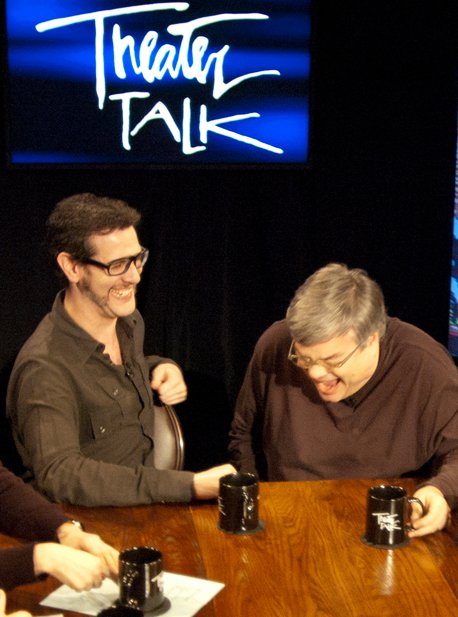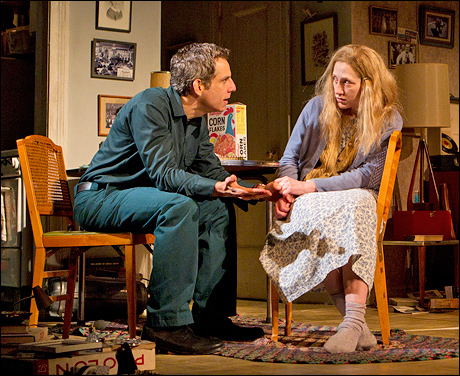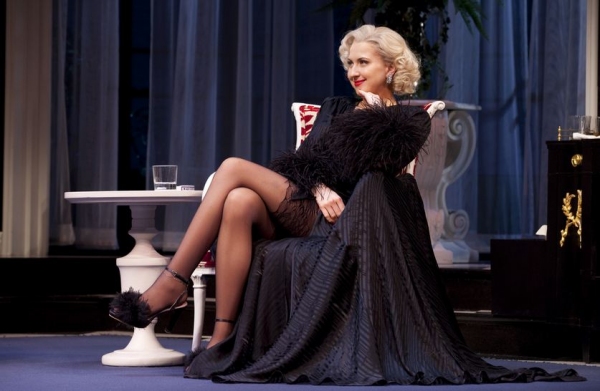 Adam Feldman, the drama critic of Time Out New York, sent me this snapshot taken on the set of CUNY-TV’s Theater Talk, where I taped an episode last week that will air later this month. In addition to Adam and me, the panel included Jacques le Sourd and Elisabeth Vincentelli. As you can see, we had a lot of fun talking about the Broadway season just past.
Adam Feldman, the drama critic of Time Out New York, sent me this snapshot taken on the set of CUNY-TV’s Theater Talk, where I taped an episode last week that will air later this month. In addition to Adam and me, the panel included Jacques le Sourd and Elisabeth Vincentelli. As you can see, we had a lot of fun talking about the Broadway season just past.
Critics can, needless to say, be sour souls–especially when they see a bunch of bad shows in a row–but I thought it might possibly amuse you to see how amused the two of us look. I only wish I knew what I was laughing at!
Archives for April 26, 2011
TT: A blacker shade of blue
In today’s Wall Street Journal I review two major revivals, The House of Blue Leaves and Born Yesterday. Here’s an excerpt.
* * *
 It’s dauntingly difficult to bring off John Guare’s “The House of Blue Leaves,” which may explain why this modern masterpiece, first performed in 1966, hasn’t been seen on Broadway since 1987. The trick is in the tone. “The House of Blue Leaves” is a comedy about hopelessness, and it plays like “You Can’t Take It With You” rewritten by Eugène Ionesco: It won’t work if it isn’t zany, and it won’t work if it isn’t horrifically disturbing. Fortunately, David Cromer has cracked Mr. Guare’s complex code with the effortless understanding that he brings to every show he stages. The result is a production in which three big names–Ben Stiller, Edie Falco and Jennifer Jason Leigh–are presented not as flop insurance but as artists, and in which full justice is done to one of the best American plays of the 20th century.
It’s dauntingly difficult to bring off John Guare’s “The House of Blue Leaves,” which may explain why this modern masterpiece, first performed in 1966, hasn’t been seen on Broadway since 1987. The trick is in the tone. “The House of Blue Leaves” is a comedy about hopelessness, and it plays like “You Can’t Take It With You” rewritten by Eugène Ionesco: It won’t work if it isn’t zany, and it won’t work if it isn’t horrifically disturbing. Fortunately, David Cromer has cracked Mr. Guare’s complex code with the effortless understanding that he brings to every show he stages. The result is a production in which three big names–Ben Stiller, Edie Falco and Jennifer Jason Leigh–are presented not as flop insurance but as artists, and in which full justice is done to one of the best American plays of the 20th century.
If you leave out the loony parts, “The House of Blue Leaves” sounds like a kitchen-sink tragedy, the story of a frustrated songwriter (Mr. Stiller) who is married to a schizophrenic (Ms. Falco) and who falls in love with his downstairs neighbor (Ms. Leigh). But Mr. Guare confounds all expectations by making Artie Shaughnessy a bad songwriter (he pays the rent by working in a zoo) and superimposing atop his painful plight a high-speed screwball-comedy plot involving three nuns and a deaf starlet (Alison Pill). Yet you are always aware of the excruciating agony of Artie and his demented wife, and though much of “The House of Blue Leaves” is wildly funny, there is no forgetting that it is a “farce” in which innocent people die.
Mr. Cromer, as is his wont, has directed “The House of Blue Leaves” for truth, not comedy, letting the humor come of its own accord (and come it does, especially in the second act) rather than forcing it off the page. As a result, much of the laughter is audibly uncomfortable, and when the terrible last scene has played itself out to the bitter end, you go home feeling stunned and drained…
 The sound that you’re hearing at the Cort Theatre these days is one of the rarest in the world: It’s the collective purr of an audience falling in love with a brand-new face. Nina Arianda made a huge impression on everyone who saw her make her professional stage debut last year in the Off-Broadway premiere of David Ives’ “Venus in Fur.” Now she’s playing the not-so-dumb-blonde in a Broadway revival of Garson Kanin’s “Born Yesterday,” the play that put Judy Holliday on the map in 1946 and is going to do the same thing for Ms. Arianda. Ms. Arianda is a charismatic comedienne who is as funny as she is sexy, and anyone capable of resisting her charms is both blind and deaf….
The sound that you’re hearing at the Cort Theatre these days is one of the rarest in the world: It’s the collective purr of an audience falling in love with a brand-new face. Nina Arianda made a huge impression on everyone who saw her make her professional stage debut last year in the Off-Broadway premiere of David Ives’ “Venus in Fur.” Now she’s playing the not-so-dumb-blonde in a Broadway revival of Garson Kanin’s “Born Yesterday,” the play that put Judy Holliday on the map in 1946 and is going to do the same thing for Ms. Arianda. Ms. Arianda is a charismatic comedienne who is as funny as she is sexy, and anyone capable of resisting her charms is both blind and deaf….
* * *
Read the whole thing here.
Nina Arianda appears in a trailer for the premiere of David Ives’ Venus in Fur:
TT: Apropos of Danse Russe (II)
From Fantasia, the opening of Walt Disney’s animated interpretation of The Rite of Spring, with the music performed by Leopold Stokowski and the Philadelphia Orchestra:
TT: Almanac
“The trouble with music appreciation in general is that people are taught to have too much respect for music; they should be taught to love it instead.”
Igor Stravinsky, “Subject: Music,” (New York Times Magazine, Sept. 27, 1964)
